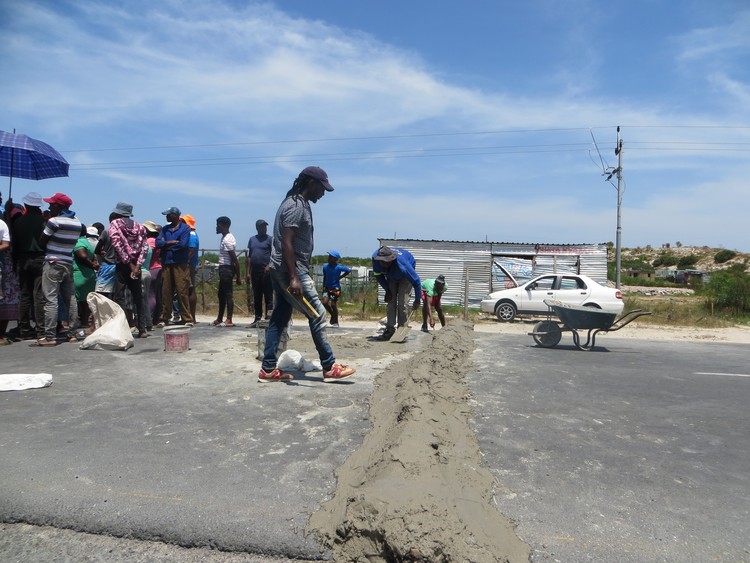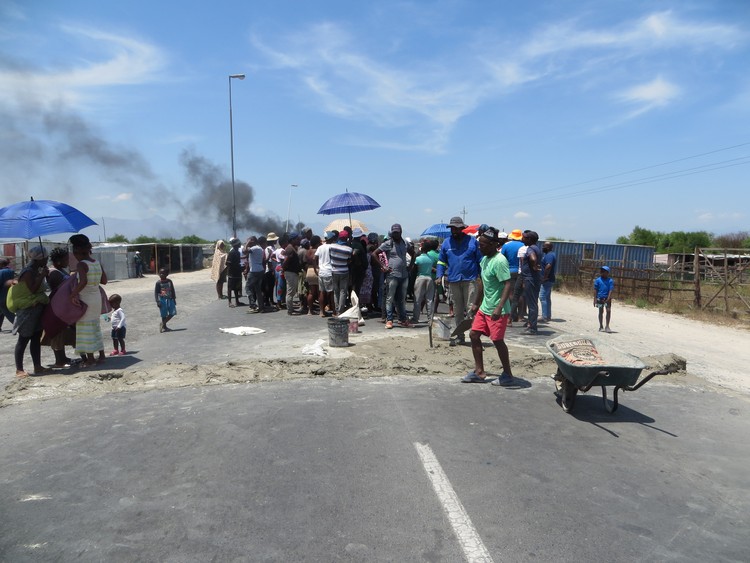Shack dwellers build makeshift speed bumps on ‘deadly’ road
At least two people died and three shacks were destroyed in a taxi accident on Old Faure Road near Mfuleni on Friday
Volunteer shack dwellers from Covid Village creating cement speed bumps along Old Faure Road near Mfuleni on Saturday. They say the municipality has not done anything to mitigate the amount of speeding accidents and subsequent deaths on this road. Photos: Vincent Lali
- Covid Village shack dwellers protested on Saturday and again on Monday morning, demanding that the City of Cape Town install speed bumps along Old Faure Road.
- At least two people, including one shack dweller, died on Friday when a taxi and a bakkie collided on the road. At least three shacks were also destroyed in the incident.
- Shack dwellers say this was one of many car accidents along Old Faure Road.
- The ward councillor says an assessment was done on the road and found that it is not suitable for the installation of speed bumps.
Traffic around Mew Way near Mfuleni, Cape Town was brought to a standstill on Monday morning by shack dwellers demanding that speed bumps be built in the area.
This was a continuation of a protest that happened on Saturday, where Covid Village shack dwellers, along Old Faure Road, also blocked the road with burning tyres and other debris. This forced dozens of minibus taxis and other vehicles to find alternative routes in and out of Mfuleni.
But the ward councillor says the City of Cape Town has assessed the road and found that it is not suitable for the installation of speed bumps.
Community leader Siviwe Mgqala told GroundUp that the shack dwellers became angry after their ward councillor snubbed their request to attend a recent community meeting to discuss the installation of speed bumps on Old Faure Road.
Mgqala said the shack dwellers want senior provincial government officials to address them about their request for speed bumps and the inadequate provision of basic services.
On Friday, a bakkie collided with the taxi which knocked two parked cars and damaged three shacks on Old Faure Road. A shack dweller from Covid Village and the taxi driver died in the incident. This recent accident further fueled residents’ anger and their safety concerns about this road, said Mgqala.
“About 25 people have died and about 20 have been injured as a result of car accidents on this road since we settled here in 2020. We are tired of witnessing such deadly accidents. We are neglected here,” he said.
Tired of waiting for officials to act, a group of residents used cement, stones and spades to create about five makeshift speed bumps along the road on Saturday.
Mgqala said: “The government is doing nothing to stop accidents here. Now we are making speed humps to prevent motorists from driving at high speeds.”
Resident Pumeza Pawuli, whose shack was destroyed by the recent taxi accident, said accidents are regular occurrences along that road.
“I want someone to help rebuild my shack because I don’t work. A few days ago, a guard went to the spaza shop when a car struck and killed him when he crossed the road,” she said.
Nolitha Balimani complained that the taxi also ploughed into her shack, nearly causing serious injury to her son who is blind. “I want the City of Cape Town to move me and my family elsewhere, otherwise I will return from work to find my son dead as a result of a car accident,” she said.
Ward Councillor Ernest Madikane told GroundUp that when the road was built, it was not anticipated that people would occupy the land along the road.
Madikane said he had already arranged food and building material for the shack dwellers whose homes were damaged during the accident. He said he met the shack dwellers at a local church in Covid Village on Sunday and explained the process to get the government to install speed bumps.
“An assessment was done and it was determined that the road is not meant or suitable for speed humps,” he said.
Congress of Democratic Taxi Associations (Codeta) spokesperson Nceba Enge said the closure of the road negatively affected taxi drivers in Mfuleni and inconvenienced residents.
Protesters blocked part of Mew Way and Old Faure Road on Saturday and again on Monday morning.
Support independent journalism
Donate using Payfast

Next: Disciplinary tribunal for tardy judge goes behind closed doors
Previous: Urgent court bid by Dipuo Peters to stop her suspension fails
© 2024 GroundUp. This article is licensed under a Creative Commons Attribution-NoDerivatives 4.0 International License.
You may republish this article, so long as you credit the authors and GroundUp, and do not change the text. Please include a link back to the original article.
We put an invisible pixel in the article so that we can count traffic to republishers. All analytics tools are solely on our servers. We do not give our logs to any third party. Logs are deleted after two weeks. We do not use any IP address identifying information except to count regional traffic. We are solely interested in counting hits, not tracking users. If you republish, please do not delete the invisible pixel.


